Salaga Jan 10, 2019
Today we woke up and went to breakfast as usual. We headed back to our hotel to use the restroom, and then, we were on our way to Salaga, 72 miles from Tamale and a famed west African slave market.
Fun Fact: our driver’s real name is Kwabna, but we have been calling him governor, for Kwabene for some reason sounded to Ty as governor. The journey was longer than we had anticipated, so we had to take a bathroom break on the side of the road. The road was sparsely populated, and Morgan was greeted by a jackrabbit. Salaga was the largest slave market in west Africa up until the late 19th century.
The dusty red dirt road lead us to the town of Salaga. When we arrived we picked up our guide, Mr. Iddi, and our first stop was to visit the drinking wells.
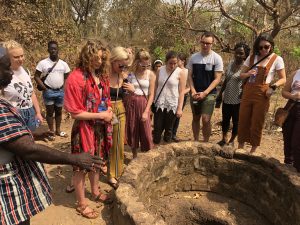
The drinking wells were dug by the slaves, so that they were able to survive during the dry season. Abdulai and our tour guide told us that the wells were often a space to hide, where the slaves could express their self agency. Then, we walked down a long dirt path to the bathing sites, Wankan-bayu, where each slave would bring their own water to bathe in.
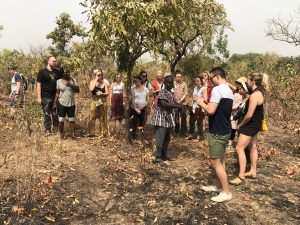
The primary reason for bathing was to make the slaves look presentable and healthy, using shea butter, before reaching the market for potential buyers. The Ghana Tourism Authority is in the process of preserving the site, however the work is incomplete and has been for a number of years.
Next, we visited the Priestess Mariama, as she tends to the mass grave site, where deceased slaves were disposed of.
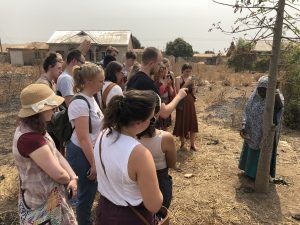
A large tree stood at the site until 2014, and when it fell, a new tree was planted in 2016.
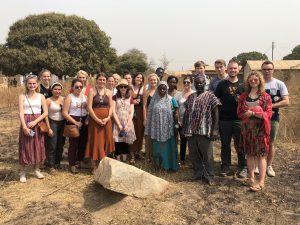
Since the bodies were not given the rightful burial, the priestess pours libation on the tree saying, “even the dead eat.” There is a rock placed near the tree that is the sole marker of what occurred at this site, which is now littered with trash and feces. Our class was inspired to try to use St. Olaf resources to better preserve and commemorate this site.
Afterwards we went to meet, Alhaji Yakubu Albashar, who met with the St. Olaf students last year. This man’s ancestry is directly related to the slave trade, in fact, he spoke Dagbani, Prof. Iddrisu’s native language which he translated for the group. But then, Hausa used to be the lingua franca of the Salaga slave market. His father was a former slave, who was captured sometime in his late teens in the village Ulu, in the Uppwr Weet region of Ghana, and worked as a domestic slave (farming and trading operations) in Salaga until being freed. The father never spoke of his past until many years of persistance. When we asked about the discussion of the slave trade in Ghana, he explained that many are afraid to ask or visit and wish to distance themselves from any slavery ancestry. This man, however feels no burdens, because as he states, “whether we are slave or free, we are all human”. The man’s father never returned to his birthplace, just as those who wish to be done with their ancestry, but Alhqji Yakubu makes it a priority to visit the birthplace of his father. Upon discovering the location in 1991 from a friendly pastor, Father Eugene, he has visited every other year, and he is planning another visit as we speak. The class yet to unpack our interview with Alhaji Yakubu as we examine issues of historical truth and the context and context of the retelling. Throughout the interview, more and more members of the community were joining our group, and several of us got the chance to play with local children before left.
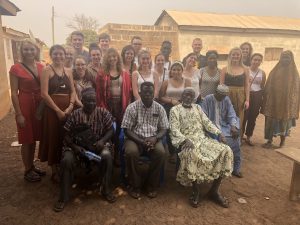
Following the interview with Alhaji Yakubu, we ventured to the site of the actual Salaga Slave Market, which is now an everyday market. There is dilapidated sign that marks the site of where slaves were sold.
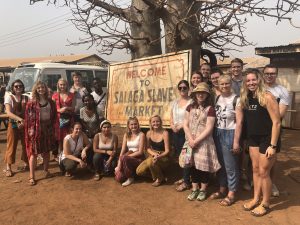
After this we traveled to an unfinished, sparse museum of artifacts used in the slave trade.
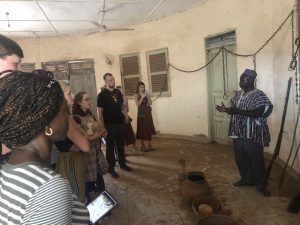
This was the final experience that we had of unfinished attempts to commemorate the devastating past of slavery and the slave trade. We think that the history we are learning about is very significant, and we really hope that in the future these sites will be completed so that a wide range of audiences can learn about this as well. It’s surprising that people in the area are less interested in these important past material remains of the slave trade and Slavery. According to Alhaji Yakubu, the Tourist Board is not even aware he exists.
We then realized that in our eagerness to see the sites, we had not introduced ourselves properly to the Chief of Salaga. Word of our arrival traveled quickly, but we did go finally to his palace to pay our respects. After going through the traditional greeting, the chief, who sees himself as the embodiment of Salaga, talked to us about the importance of their history, but also, was not too pleased we failed to visit him first.
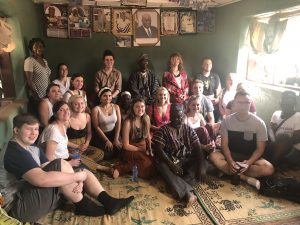
We also had time to make friends with some children at the Salaga chief’s palace.
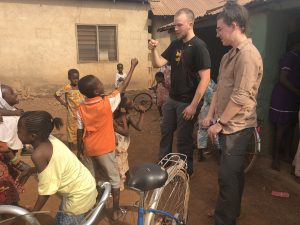
After a long day in Salaga, we made our way back to Tamale. Once we returned to our hotel, our group segued into a discussion regarding Ghanaian news published on the website, GhanaWeb. One developing story details the ongoing criminal investigation of Nana Appiah Mensah, a CEO of a Ghanaian gold distributor, who has been involved in some shady dealings and has been noticed as being in suspiciously close proximity to the Ghanaian executive leadership. The authorities have requested for a Red Notice from INTERPOL to be placed on him. In religiously-oriented news, the renowned Reverend Isaac Owusu Bempah has apologized to the Chief Imam for prophecying his death in the near future, as well as the deaths of former President John Mahama and current Vice President Mahamudu Bawumia. Finally, the licenses of two major Ghanaian banks have been revoked by the central bank on account of irresponsible transactions and unprofessional management practices. Many Dagombas are also moving towards Yendi to perform the funeral of the late overload of Dagbon, Yaa Naa Yakubu Andani II.
We finished our day with dinner in the market — chicken and rice! Now we are signing off for the day. Goodnight!
Emily, Erin, Julia, and Matt
